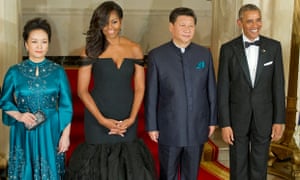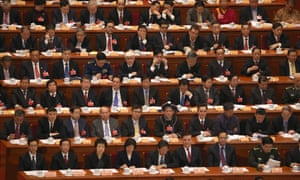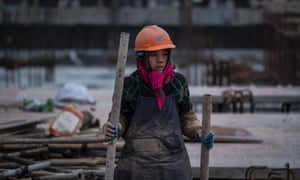Tom Phillips
After domestic victories in 2016, China’s president must deal with a worsening economy and Trump in the White House
In his 2016 new year message the Chinese president, Xi Jinping, promised his 1.3 billion citizens that the coming 12 months would be a time of “openness and sharing”.
“The future is encouraging and inspiring,” Xi enthused in his upbeat annual address.
In fact, 2016 was a year of continued economic slowdown and political tightening as the leaders of one-party China sought to further assert their control over the country with one eye on economic storm clouds ahead.
Free speech was increasingly curtailed while prominent activists continued to languish in jail after the launch of a major crackdown on human rights lawyers in 2015. Beijing continued to ignore muted international calls for their release.
In Hong Kong, the former British colony that returned to Chinese control in 1997, the mood was scarcely more upbeat, with renewed street protests after Beijing moved to bar two pro-independence politicians from taking up their seats in the city’s parliament.
Pro-democracy campaigners accused Beijing of stripping Hong Kong of its much-cherished autonomy and warned that the “one country, two systems” framework under which it is ruled was being increasingly undermined by the Communist party’s meddling.
In October he was declared the “core leader” of the 88 million-member Communist party, a title only previously bestowed upon three leaders, Jiang Zemin, Deng Xiaoping and Chairman Mao.
That reaffirming of Xi’s supreme leadership will strengthen him in the lead-up to the 19th Communist party congress next autumn, when his assumed 10-year term reaches the half-way point.
But daunting challenges lie ahead in 2017. The run-up to that congress will see an intense and potentially treacherous period of political jockeying as Xi attempts to deepen his control of the party by elevating allies to key positions.
The economy, already growing at its weakest rate in 25 years, is likely to slow further as China’s export- and investment-driven boom continues to run out of steam. Xi will also face a number of severe foreign policy headaches, not least formulating a response to Donald Trump’s presidency in the US and potential policy shifts on issues such as North Korea.
Then there is the South China Sea. China has been locked into a series of acrimonious territorial disputes with neighbours such as Vietnam and the Philippines.
In July, an international tribunal infuriated Beijing when it responded to a case brought by the Philippines by issuing a thorough rebuke of China’s sweeping historical claims to vast areas of the $4.5tn trade route. Beijing immediately rejected the ruling.
The May election of Rodrigo Duterte looked to have eased some of those tensions with the Philippines’ new leader flying into Beijing in October to kick off an unexpected rapprochement with Xi that saw the territorial dispute brushed aside.
In the wake of that visit – which analysts described as a major strategic coup for China and a thumb in the eye of Washington, a longtime ally of the Philippines – Beijing and Manila appeared to set aside their differences over the South China Sea in favour of economic collaboration.
To Beijing’s delight, Duterte declared he would realign his country in China’s “ideological flow”.
 FacebookTwitterPinterest Xi Jinping and Barack Obama, pictured with their wives Peng Liyuan and Michelle Obama. Photograph: Getty Images
FacebookTwitterPinterest Xi Jinping and Barack Obama, pictured with their wives Peng Liyuan and Michelle Obama. Photograph: Getty Images
Another Chinese triumph came in September when Xi and Barack Obama came together during China’s first G20 to announce that the world’s top two polluters would ratify the Paris climate agreement.
Activists hailed the move as a major breakthrough in the fight against global warming. But just weeks later, the gloss came off that much-lauded achievement with the election of climate change denier Trump to the White House.
The victory of Trump, who has called global warming a Chinese hoax, looks to spell the end of the climate collaboration between the people in the world’s two most powerful jobs – a rare bright spot in US-China relations under Obama – although some predict 2017 could see an unexpected revival of relations between Washington and Beijing.
China will enter the year of the rooster in January – the same year in which the Chinese Communist party was founded almost a century ago, in 1921. It remains to be seen whether Xi will continue to ruffle feathers in 2017.


No comments:
Post a Comment